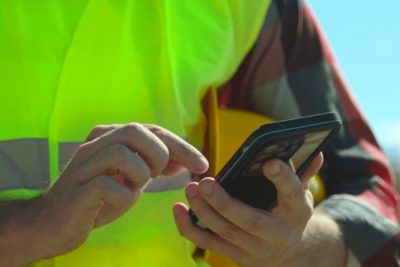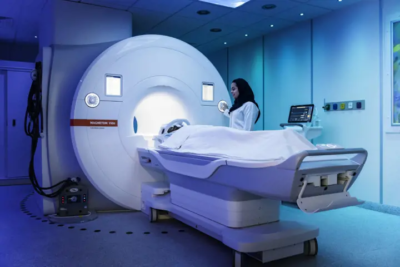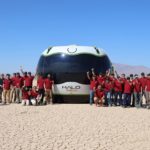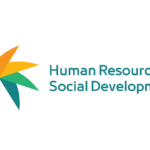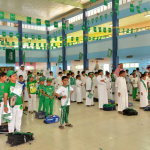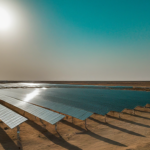
“The ground-breaking of our new facility at SPARK represents a significant investment and an important milestone in Honeywell’s long history of partnership Saudi Arabia, which dates back to 1948. We are proud to support Saudi Arabia’s most important companies in localizing and developing innovative technologies to advance critical sectors of the economy. SPARK is the perfect location for us to continue our journey of investment, localization and growth in the Kingdom in-line with its sustainability goals and broader Vision 2030 objectives.”
-Abdullah Al-juffali, Honeywell’s president of Saudi Arabia and Bahrain. [Zawya]

“Luxury publisher Assouline adds the new title Saudi Coffee: The Culture of Hospitality to its Classics Collection range. Written by Saudi Arabian Chef, Hospitality Professional, and Culinary Educator Maher Raed Al Nammary, the book explores Saudi Arabia’s coffee, from seedling to refreshment, and its long history as a symbol in the region.”
-hypebae.com

“The traditional monogamous relationship with the US is now over. And we have gone into a more open relationship; strong with the US but equally strong with China, India, (the) UK, France and others.”
–Ali Shihabi, a Saudi analyst and writer, as quoted in CNN. “Analysts, however, say that the Middle East is unlikely to become an arena for US-Chinese rivalry, given Beijing’s economy-oriented focus and its aversion to playing regional politics. The Saudi-China relationship is therefore unlikely to become a full-blown alliance.” [CNN]

“Goldman Sachs estimates that EVs will make up about half of new-car sales worldwide by 2035, according to a research report published Feb. 10. Noel expects Ford’s Gulf roll out to go “exceptionally well.” “We’ve seen adoption rates in some of the Middle East markets exceed the growth curve that the industry data had projected. Israel is already at 10% for battery electric vehicles,” he said. “It’s actually quite surprising considering the acquisition cost that they’ve achieved that level of penetration so quickly.”
Ford’s First Electric Vehicles for Gulf Region Coming Next Year [Bloomberg]

“Saudi Arabia’s General Food Security Authority (GFSA) has issued several tips as part of its National Program for Reducing Food Loss and Waste in the Kingdom. The campaign aims to raise awareness about food security and preventing food waste and also encourages people to maintain good and healthy consumption practices. GFSA noted that the rate of food loss and waste in the Kingdom is about 33 percent and the value of food waste is estimated at $10.66 billion annually.”
Saudi Arabia shares tips to prevent food waste during Ramadan [Al-Arabiya]

“IBM’s in-depth study of more than 500 actual data breaches in 17 countries over the past year shows that the Middle East ranks second in terms of the average cost of security breaches among the regions surveyed. The study on organisations surveyed in the Kingdom of Saudi Arabia and the UAE suggests that security incidents became more costly and harder to contain due to drastic operational shifts during the pandemic. Some of the most popular types of cyberattacks include phishing, scam, malware and ransomware.”
Cybersecurity gains relevance as digitisation becomes a trend in the Middle East [Gulf News]

“I think there have been a lot of questions about why we are hosting these events in the kingdom. We host it for the people, for the youth. As you may know, 70% of the population of Saudi is below the age of 40, and we see that on the ground today… When we the Joshua/Ruiz Jr. world title fight in 2019, there were just six gyms in Saudi Arabia that had boxing. Now we have 57, and the participation in the sport grew by 300%.” Prince Abdulaziz bin Turki Al Faisal, Saudi Arabia’s Minister of Sports. Why Saudi Arabia is not put off by its F1 critics [Motorsport]

“The week’s worth of events and announcements were sequenced to have a particular effect. The most important was to show that Saudi Arabia has agency over its own future. It did more than hand a diplomatic victory to China, its leading oil customer. It bookended that victory with actions that were meant to appeal to the United States—its leading security provider—and put Israel—a prospective partner—on notice. The Boeing deal reinforced not only that Saudi Arabia is a serious economic player, but also that it is willing to act independently and without an entangling set of diplomatic negotiations and concessions.”
Jon B. Alterman, SVP and Director, Middle East Program, Center for Strategic and International Studies (CSIS). Saudi Arabia Steps Out [CSIS]

“Five countries in the region have seen food inflation going beyond 60 percent just this year, with Lebanon and Syria facing triple-digit food inflation at 138 percent and 105 percent respectively. In Iran, Turkey, and Egypt, annual food inflation is more than 61 percent, making it difficult for families to afford essential food items like bread, rice, and vegetables.”

“This is likely the beginning of a new era of Saudi diplomacy, and it will mean much more work for the Saudis. Like most diplomacy, many of its wins are likely to be partial. But to a degree unseen in decades, the Saudis are stepping out on their own.”
Jon Alterman, SVP and Director of the Middle East Program, Center for Strategic and International Studies (CSIS), Saudi Arabia Steps Out [CSIS]

